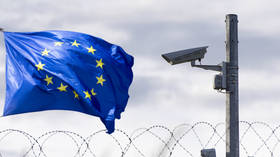The US is behind the poisoning of China’s relationships with the Baltic states

Lithuania, always anxious to seek to please Washington, has angered Beijing by allowing Taiwan to open an office in its capital. Is it just the yapping of a lap dog, or something more serious?
China has withdrawn its ambassador from Lithuania and expelled its ambassador from Beijing, citing a violation of its “One China” policy following Vilnius’s decision to open a “Taiwan representative office” in the country, which has crossed a red line for Beijing.
Also on rt.com Whether or not America should militarily defend Taiwan from China is up for debate - whether or not it could isn’tChina rigorously enforces its One China policy as a prerequisite commitment for diplomatic relations, which requires that states do not officially recognize the regime in Taipei, which Beijing deems a breakaway state. Although most countries in the world follow this principle on paper, in practice it has been meeting growing subtle resistance from the West in the past few years as the geopolitical context has changed.
While few would cross the red line directly, Lithuania has recently transformed itself into a leading anti-China aggravator in Europe, having also withdrawn itself from the 17+1 dialogue mechanism with China and Eastern European states. It has subsequently sought to build ties with Taiwan. But the question is, why? China has done nothing to provoke Lithuania or clash with it, a country which is geographically speaking a minor player in the EU and not a major power. Economic ties between the two aren’t large. Other Baltic states have similarly turned hostile to Beijing, although none have gone as far as Lithuania.
The answer is not because of China's actions, but because of the United States and its battle to seek to contain Beijing. Lithuania, ever anxious to try to please America, thinks this move will curry favour in Washington.
To put it bluntly: The Baltics are turning anti-China because their national interests rest on being “client states” of the United States, given that they lack the economic leverage, relevance and military prowess to shape a relationship with China, or for that matter, Washington, on their own terms or benefits. They therefore believe they have to coalesce around one major power.
So Vilnius, and other Baltic capitals, actively seek to antagonize Beijing in order to draw praise and plaudits from the United States, who they fear slipping away from.
In international relations, all states are equal units, but ultimately unequal in terms of power. There are roughly four categories of “power”, measured by many different variables, that a state can fit into: 1) a superpower or hegemon; 2) a great power; 3) a middle power; and 4) smaller states.
Also on rt.com The US is fooling itself if it believes the EU backs its aggression against China. Serious transatlantic rifts over Beijing remainThe first category consists of countries such as the US, Russia or China, with immense military and economic capabilities, who can shape affairs on a global scale. The second are states that are globally powerful, but not wholly dominant, such as Britain, France and Japan. A middle power is a country that has dominance in a specific geographic region, such as Turkey, Australia or Brazil, and smaller states are obviously composed of smaller and weaker countries who lack sufficient power projection of their own, irrespective of size. These states notably lean towards a superpower in order to secure their respective national interests. They are not the ‘rule makers', they are ‘rule takers’.
The Baltic states, Latvia, Lithuania and Estonia, are in this latter category. They are three small countries who, since becoming independent from the USSR in 1991, have subsequently incorporated themselves into the Western alliance system in order to facilitate their economic and security needs. They follow the hegemon religiously as a result.
Middle powers of a slighter larger size, such as Poland, are more confident in how they can forge a relationship with superpowers such as China, while holding their respective allegiances with the EU and America. The Baltic states, however, do not believe they have this privilege and perceive that their national objectives are more firmly pinned to Washington’s mast.
As a result, the United States has had considerably more leverage and power to persuade these countries into also taking a more hostile approach to Beijing. The Baltic states hardly need persuading – they are happy to take the lead, seeking to please their masters.
This dynamic has arguably been intensified by Washington’s attempt to actually de-escalate tensions with Russia, which provokes anxiety in the Baltics and other countries. They fear the US could abandon them. Lithuania thus makes its moves because it hopes to “draw in the US” and make itself “relevant”, so that it is not forgotten. Take for example, Ukraine. Kiev recently joined an anti-China statement on Xinjiang pushed by the US and Canada, and it did so because the US is leveraging its security relationship, basically saying “if you want our support, you have to be anti-China”.
However, in this case, it backfired: China reprimanded Kiev and the Ukranians changed course, suddenly making a load of pro-China overtures to appease Beijing (and partly driven by its feeling Ukraine has not received the sort of support from the US that it was expecting). While Ukraine is reliant on an economic relationship with China, Lithuania is not, therefore Vilnius believes it can upset China and only win plaudits for itself, as opposed to punishments.
This behaviour may also be compounded by the instinctive anti-communism of the Baltics, stemming from their time under Soviet rule. As Lithuania broke away from the USSR, Taiwan seeks to break away from China, and Vilnius identifies with that sort of cause.
Yet given that China is not posing any kind of threat to Lithuania, it is the dynamics of great-power politics that has poisoned the well. There are few other countries in Europe who are siding so resolutely with the US, and if Washington says “jump”, it seems the only question Lithuania asks is, “Is this high enough?”
Like this story? Share it with a friend!
The statements, views and opinions expressed in this column are solely those of the author and do not necessarily represent those of RT.















